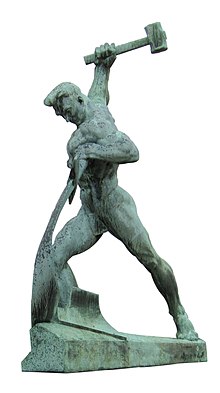鑄劍為犁
| 此條目可參照德語維基百科相應條目來擴充,此條目在對應語言版為高品質條目。 (2021年11月29日) |

鑄劍為犁(英語:swords to ploughshares 〔英〕/ swords to plowshares〔美〕),是指將軍事武器及/或科技轉換為和平的民用用途的概念,中文類似說法有偃武修文。
辭源[編輯]
該比喻於西方世界的應用源自《舊約聖經》的〈以賽亞書〉、〈約珥書〉及〈彌迦書〉:
必有許多國的民前往,說:「來吧!我們登耶和華的山,奔雅各 神的殿;主必將他的道教訓我們,我們也要行他的路。因為訓誨必出於錫安;耶和華的言語必出於耶路撒冷。」他必在列國中施行審判,為許多國民斷定是非。他們要將刀打成犁頭,把槍打成鐮刀;這國不舉刀攻擊那國,他們也不再學習戰事。
——以賽亞書2:3–4
要將犁頭打成刀劍,將鐮刀打成戈矛。軟弱的要說:我有勇力。
他必在多國的民中施行審判,為遠方強盛的國斷定是非。他們要將刀打成犁頭,把槍打成鐮刀。這國不舉刀攻擊那國,他們也不再學習戰事。
——彌迦書4:3
犁(希伯來語:אֵת,羅馬化:』êṯ)常被視為造福人類的建設性工具的象徵,與戰爭用以殺傷毀滅為目的的武器相對,其代表為劍(希伯來語:חֶרֶב,羅馬化:ḥereḇ),同樣是鋒利的金屬工具,用途卻截然不同。
而東方歷史上也有類似的表述,語出《孔子家語》的〈致思〉第八:
回聞薰蕕不同器而藏,堯桀不共國而治,以其類異也。回願得明王聖主輔相之,敷其五教,導之以禮樂,使民城郭不修,溝池不越,鑄劍戟以為農器,放牛馬於原藪,室家無離曠之思,千歲無戰鬥之患。則由無所施其勇,而賜無所用其辯矣。
聯合國花園裏的青銅雕像中可見到該概念的表達,這個名為《鑄劍為犁》(Let Us Beat Swords into Plowshares)的雕像是來自蘇聯的禮物,由葉夫根尼·維克多羅維奇·武切季奇雕刻,刻畫了一個人用錘子將劍打成犁的形狀的動作。
實際應用[編輯]
截至2013年,拆除核武器並將其內容物轉為核電燃料的「兆噸換兆瓦計劃」是「鑄劍為犁」最典型的例子。另外,原本為二戰之需而迅速發展的核裂變技術,在廣島和長崎兩次核爆之後,也已用作包括放射治療在內的許多民事用途。
- 第二次世界大戰後,一些軍用剩餘的裝甲車被改造為推土機、農用拖拉機和伐木拖拉機,如美國電視連續劇《斧頭人》(Axe Men)中所見。[1]目前,加拿大的劍與犁博物館(Swords and Ploughshares Museum)收藏了其中的兩個。[2][3]法國農民曾使用過時的雷諾FT-17坦克改裝版,而基於T-34坦克的類似車輛在前蘇聯仍然廣泛使用。[4]英國農業工程師、經典拖拉機收藏者羅伯特·克勞福德(Robert Crawford)擁有一輛雪曼戰車,該坦克因履帶拖拉機短缺而被改裝用來犁林肯郡的土地。
- 1970年代開始,幾位反戰音樂家以由軍用剩餘武器製成的結他來演奏。牙買加雷鬼歌手彼得·陶許擁有一架以M-16步槍為原型的Fender Stratocaster。[5]在當代,槍結他——由AK-47改造而成的結他——是César López、Souriya Sunshine和芬蘭死亡金屬樂隊Sentenced的Sami Lopakka的標誌性樂器。[6]
- 由第一次世界大戰化學武器芥子氣開發而成的氮芥[7]成為了世界上第一個化療藥物鹽酸氮芥的基礎,該藥物於20世紀40年代製成。[8]
- 瑞典援助組織IM Swedish Development Partner推出了Humanium Metal,它使用非法手槍中的金屬製造日常用品。其宣佈的第一個產品是Yevo的耳機。[9]
- 全球定位系統由美國開發,最初目的是以遠程武器實現更精確打擊,但後來其用途擴展到包括民用,例如個人導航裝置。
- 丹尼爾·貝里根創立的犁頭運動是一個基督教和平運動,其靈感來自《以賽亞書》,其參與者會試圖破壞或摧毀核導彈等現代武器。
政治和大眾文化中[編輯]
- 十二屆美國國會議員和三屆總統候選人榮·保羅寫了一本書,題為《鑄劍為犁:戰時的生活以及和平與繁榮的未來》(Swords into Plowshares: A Life in Wartime and a Future of Peace and Prosperity) ,他在書中討論了第二次世界大戰期間及戰後的經歷。[10]
- 美國總統德懷特·艾森豪威爾在告別演說中談到軍事工業複合體時說:
Until the latest of our world conflicts, the United States had no armaments industry. American makers of plowshares could, with time and as required, make swords as well. But now we can no longer risk emergency improvisation of national defense; we have been compelled to create a permanent armaments industry of vast proportions. Added to this, three and a half million men and women are directly engaged in the defense establishment. We annually spend on military security more than the net income of all United States corporations.
直到最近一次世界衝突之前,美國沒有任何軍事工業。只要有時間和需要,美國的犁頭製造商也可以製造刀劍。但現在我們不能再冒險臨時拼湊國防;我們被迫建立了一個規模巨大的永久性軍事工業。此外,350萬男女直接參與國防建設。我們每年用於軍事安全的開支超過了所有美國公司的淨收入。
- 美國總統理查德·尼克遜在第一次和第二次就職典禮上宣誓就職時,手按兩本家用《聖經》,《聖經》翻開到了《以賽亞書》2:2–4。[11][12][13]
- 吉米·卡特、安瓦爾·薩達特和梅納赫姆·貝京在1979年《埃及-以色列和平條約》簽署時的講話中,都引用了這段呼籲和平的名言。[14]
- 朗奴·列根在紐約紐約聯合國大會第42屆會議上的講話中講到:[15]
Cannot swords be turned to plowshares? Can we and all nations not live in peace? In our obsession with antagonisms of the moment, we often forget how much unites all the members of humanity. Perhaps we need some outside, universal threat to make us recognize this common bond. I occasionally think how quickly our differences world-wide would vanish if we were facing an alien threat from outside this world. And yet, I ask you, is not an alien force already among us? What could be more alien than war and the threat of war?
劍不能變成犁頭嗎?我們不能和所有的國家和平相處嗎?當我們沉迷於一時的敵對情緒時,我們常常忘記所有人類成員是如何團結在一起的。也許我們需要一些外部的、普遍的威脅來讓我們認識到這一共同的紐帶。我有時會想,如果我們面臨來自這個世界以外的異己的威脅,我在世界範圍內的分歧會消失得有多快。然而,我問你,不是已經有一種異己的力量在我們中間了嗎?還有什麼比戰爭和戰爭的威脅更異己呢?
- 流行反戰歌曲《葡萄樹與無花果樹》(The Vine and Fig Tree)重複了這節經文:[16]
And everyone neath their vine and fig tree 葡萄樹與無花果樹下的每個人
shall live in peace and unafraid, 都能平安、無懼地生活。
Everyone neath their vine and fig tree 葡萄樹與無花果樹下的每個人
shall live in peace and unafraid. 都能平安、無懼地生活。
And into ploughshares beat their swords 將劍打成犁頭,
Nations shall learn war no more. 各國不再學習戰事。
And into ploughshares beat their swords 將劍打成犁頭,
Nations shall learn war no more. 各國不再學習戰事。
- 唐·亨利(1989)的歌曲《The End of the Innocence》使用了《約珥書》相反的形式:
O' beautiful, for spacious skies 噢,無垠的天空如此美麗
But now those skies are threatening 但如今天空正在威脅
They're beating plowshares into swords 它們正鑄犁為劍
For this tired old man that we elected king 因為我們選了那位老人為王
Create a world with no fear 創造一個免於恐懼的世界
Together we'll cry happy tears 我們將喜極而泣
See the nations turn 看着天下萬國
Their swords into plowshares 將劍鑄成犁頭
- 音樂劇《悲慘世界》的結尾:
They will live again in freedom 他們將在自由里重生
In the garden of the Lord. 在主的田園裏。
They will walk behind the ploughshare, 他們會走在犁把後面,
They will put away the sword. 他們將放下利劍。
The chain will be broken 枷鎖將被打碎,
And all men will have their reward. 所有人都將得到應有的回報。
- 以色列詩人耶胡達·阿米亥的詩:
Don’t stop after beating the swords 鑄劍為犁之後不要停下,
into plowshares, don’t stop! Go on beating 不要停下!繼續打
and make musical instruments out of them. 將它們造成樂器。
Whoever wants to make war again 誰若想再挑起戰爭
will have to turn them into plowshares first. 必先把它們重新打成犁。
參見[編輯]
參考文獻[編輯]
- ^ Templar, Simon. Civilian Shermans: after the war – they went to work.... 11 October 2015 [11 June 2017]. (原始內容存檔於2016-08-10).
- ^ Spoelstra, Hanno. Shermans into ploughshares. web.inter.nl.net. [11 June 2017]. (原始內容存檔於2019-09-11).
- ^ The Swords And Ploughshares Museum. www.calnan.com. [11 June 2017]. (原始內容存檔於2018-02-02).
- ^ BBC NEWS – Monitoring – Media reports – Ukraine turns tank into tractor. news.bbc.co.uk. [11 June 2017]. (原始內容存檔於2004-04-09).
- ^ More Than Music: Peter Tosh And His M16 Rifle Guitar. [11 June 2017]. (原始內容存檔於2018-02-15).
- ^ UNODC. UNODC Perspectives No. 3 – Escopetarra: Instrument of peace. www.unodc.org. [11 June 2017]. (原始內容存檔於2018-07-29).
- ^ United States Department of State, Bureau of Arms Control, Verification and Compliance; United States Department of Commerce, Bureau of Industry and Security. Introduction to Industry Implementation of the Chemical Weapons Convention (PDF). cwc.gov. May 2004 [2019-12-27]. (原始內容 (PDF)存檔於2013-10-20).
- ^ Gilman A. The initial clinical trial of nitrogen mustard. Am. J. Surg. May 1963, 105 (5): 574–8. PMID 13947966. doi:10.1016/0002-9610(63)90232-0.
- ^ Kleinman, Zoe. Illegal guns turned into headphones. BBC News. 2018 [2018-01-15]. (原始內容存檔於2018-01-11) (英國英語).
- ^ Paul, Ron. Swords into Plowshares. Ron Paul Institute for Peace and Prosperity. 17 July 2015 [11 June 2017]. (原始內容存檔於2020-01-09).
- ^ United Press International (UPI). Protestors' shouts mar inaugural ceremonies. 20 January 1973 [18 October 2017]. (原始內容存檔於2019-12-27).
- ^ These Are the Bible Verses Past Presidents Have Turned to on Inauguration Day. Time. [2019-12-27]. (原始內容存檔於2019-05-30).
- ^ Ross, Scott. Obama's Inaugural Bibles: Lincoln, MLK. NBC 6 South Florida. 21 January 2013 [18 October 2017]. (原始內容存檔於2017-10-19).
- ^ Public Papers of the Presidents of the United States, Jimmy Carter. Office of the Federal Register. 1979: 518–520 [2019-12-27]. (原始內容存檔於2013-09-20).
- ^ Ronald Reagan Presidential Library Archives. UTexas.edu. 1987-09-21 [2013-01-01]. (原始內容存檔於2012-11-02).
- ^ Greenham Common Women's Peace Camp Songbook. Fredsakademiet.dk. [2013-01-01]. (原始內容存檔於2012-10-15).
